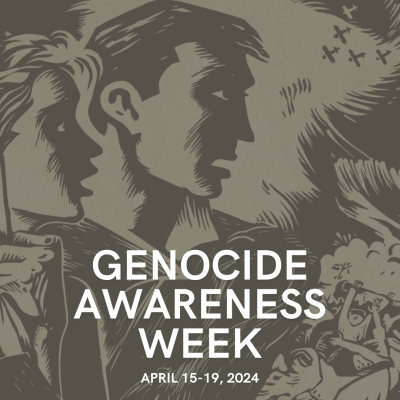On April 15th, students, faculty and guests gathered for the Rosenbluth Family Charitable Foundation Genocide Awareness Week Conference. This event is a series of lectures, exhibits and storytelling by distinguished survivors, scholars, politicians, activists, artists, humanitarians and members of law enforcement. The week-long event seeks to address how we, as a global society, confront violent actions and current and ongoing threats of genocide throughout the world, while also looking to the past for guidance and to honor those affected by genocide.
To kick off the week, a group of seven 2G students (children of survivors) gathered for a panel discussion on “Living in the Legacy, Growing Up with Genocide”. This discussion consisted of a series of questions about their life experiences. Students enjoyed the ability to speak on behalf of their experiences; “This panel was eye-opening and full of interpersonal warmth; I adored everyone's openness and willingness to share vulnerable truths!” stated panel guest, Edna Zuhric.
Following is a list of questions that were discussed during the panel and answered by Zuhric.
What challenges do you face as 2Gs?
It is a challenge to try to assimilate into the culture of the U.S. (that has little to no genocide education) whilst also trying to be part of a culture heavily impacted by it. Trying to mesh the two worlds always feels impossible.
How much/little have your family members shared with you about their experiences?
Some of my family has been outspoken, primarily the women in my life. The men in my life are silent about it. I am not sure if this is individual or more of a gendered norm; I feel as though the culture back in Bosnia encourages hegemonic masculinity so men are less likely to talk about their trauma. The women, I think, got fed up with being silent and often shared it as a form of connection.
What advice would you give to other young people moving to the U.S. to help with the transition?
To move to the U.S., I feel like sticking close to your culture and your family helps a lot. Being part of the diaspora community is very powerful.
What helped and supported you in your journey to ASU?
Professors who want to learn more and to listen to our stories help tremendously. Even if it's not part of the curriculum, taking extra time to ask 2G or 1G students about this kind of history helps establish a closer relationship and makes sure students don't feel ignored.
Have you found ASU to be helpful/supportive of students?
ASU, for the most part, is supportive in GAW work. It is amazing to have all these scholars show up and lecture about their research! It makes survivors feel seen.
